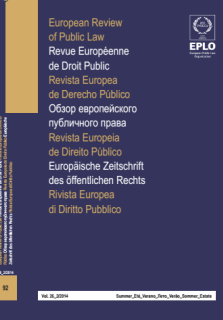
PUBLIC LAW AND SOLIDARITY IN GERMANY
STEFAN LORENZMEIER
Dr., LL.M. (Lugd.), University of Augsburg
The legal principle of solidarity is a fundamental principle of the German Constitution and it addresses several societal issues including the pension system, the asylum system, social security, the protection of the environment or the availability of basic services at a reasonable price. In Germany, the special status of an enforceable legal right had been granted to this principle and it is regarded as being part of the human dignity as laid down in Art. 1 Basic Law. The principle of solidarity has a European Union dimension as well, which is acknowledged by Art. 23 Basic Law, and it is part of the European Social Charter of the Council of Europe. Internationally, solidarity is mainly based on the International Covenant on Economic, Social and Cultural Rights to which Germany is a party. A different aspect of the international concept of solidarity are the rules on the allocation of fresh water resources.
Le principe juridique de solidarité est un principe fondamental de la Constitution allemande et concerne certaines questions de société comme le système de pensions, le système d'asile, la sécurité sociale, la protection de l'environnement ou l'accessibilité à des services de base à un prix raisonnable. En Allemagne, le statut spécial de droit juridique exécutoire a été garanti à ce principe et il est considéré comme faisant partie de la dignité humaine telle que définie à l'article premier de la Loi fondamentale. Le principe de solidarité a aussi une dimension européenne, reconnue par l'article 23 de la Loi fondamentale, et figure dans la Charte sociale européenne du Conseil de l'Europe. Sur le plan international, la solidarité est fondée principalement sur le Pacte international relatif aux droits économiques, sociaux et culturels, que l'Allemagne a signé. Un autre aspect du concept international de solidarité consiste dans les règles sur la répartition des ressources en eau.





















